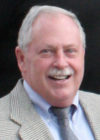HOME | ABOUT US | MEDIA KIT | CONTACT US | INQUIRE
HOME | ABOUT US | MEDIA KIT | CONTACT US | INQUIRE
T-Mobile merger crimps sense of community.

For decades, Sprint was the dominant brand in the Kansas City region, and the organization was deeply rooted in the fabric of our great city. Over the years and despite its growth and significant cashflow, Sprint encountered financial struggles trying to compete with carriers such as AT&T and Verizon.
We bought Ingram’s in 1997—a few years after Paul Henson retired as chairman of Sprint and only a few months before his death.
During this era, Bill Esrey and Ron LeMay had a firm grasp on an empire that enjoyed massive growth and remarkable revenues. At this time Sprint was the sponsor of Ingram’s Daily News Fax. Archaic as it may sound, we delivered breaking news daily by fax blasts to thousands of execs throughout the region. I know the Commerce Bank Kempers and folks there will remember printing this daily fax on a large wide-carriage printer and hanging the news in the lobby of their then relatively new headquarters. I think we call these kiosks today.
This was the same year that JE Dunn constructed the first buildings on the Sprint worldwide headquarters campus. Bill Esrey would tell the story of building the Sprint Campus shrine—the largest office complex in the Midwest at the time. It includes 3.9 million square feet of space in 17 buildings on 200 acres in Overland Park. I suspect Esrey may not be alone in regretting the construction of this massive complex. He’s commented time and again of how remarkably profitable the company was when operating from its far more humble Shawnee Mission Parkway headquarters.
The Esrey and LeMay era at Sprint was an exciting and lucrative one. It preceded all of the hype and wasted energy of M&A at a time when Sprint served this area as perhaps its most significant corporate citizen. I remember speaking with Bill Esrey soon after news broke about plans to build Kansas Speedway. Sprint was then the title sponsor of the Firecracker 400 in Las Vegas, so I suggested it might be a good idea to organize a trip including area media to one of the NASCAR races.
I received a call from Bill about a year later and he simply said, “It was your idea and we’re doing it—we want you and Michelle and a few other folks from area media to join us in Las Vegas for the race.”
This was one hell of a perk and few organizations in the region have the clout to underwrite the kinds of events and programs Sprint could.
On another occasion we accompanied Sprint execs, board members and clients to one hell of a pre-concert event in a warehouse in the West Bottoms. Some may recall the retro furnishings, decor and the gifts and perks. The event was followed by front-row seats to the Rolling Stones concert at Kemper Arena—a tour Sprint had a hand in underwriting.
I’m painfully reminded of how much I miss those days when Sprint was so deeply engaged here and how thoughtful they were to the community, including small businesses like our own. Succession was in good hands at Sprint with Gary Forsee, who served as the CEO and chairman of Sprint Nextel from 2003 to 2007 before serving as president of University of Missouri system until 2011. Forsee was at the helm in 2005 during the Sprint Nextel merger—regrettably considered one of the worst acquisitions ever, at $35 billion.
It’s a sad day and a discouraging loss to see the Sprint brand evaporate by a company that they probably should have acquired years ago.
This was also the era when the company claimed naming rights to Sprint Center, which opened in October 2007. I don’t recall the sponsorship value, but I do know few organizations were in a position to fund naming rights. Sprint stepped up once again.
Dan Hesse succeeded Forsee, serving as chairman and CEO from 2007 until August 2014—shortly after the $1 billion tax abatement expired on the Sprint campus.
Another difficult decision was made in 2012 when the company overhauled its infrastructure which included shutting down the Nextel network. I believe Hesse served during the most challenging era at Sprint.
Dan is a great guy and he’s an inordinately loyal citizen. He’s also openly disappointed about Sprint’s loss of civic connectivity. Chatting with Dan last fall in South Bend—he’s an avid Notre Dame alum and fan—he mentioned how dangerously close at one point Sprint was to closing its doors. Something had to be done, and eventually the Softbank stock purchase stabilized the corporation.
Sadly, however, the mind-set of Softbank and succession in leadership at Sprinthas been disappointing, and for the most part, absent since Hesse left Sprint in 2014.
Perhaps Marcelo Claure was hired to find a successor, but we don’t see much of him or signs of a pulse at what once was arguably the most successful company in the history of Kansas City. What Claure, Softbank and others at Sprint may not realize or even care about, is that Sprint was once a financial engine and great corporate citizen, a role that has been reduced to fragments. Time will tell if T-Mobile will continue ties with Kansas City, but there will likely be more space to lease at the campus that will soon be stripped of its name.
It’s a sad day and a discouraging loss to see the Sprint brand evaporate by a company that they probably should have acquired years ago. I want to thank Bill Esrey, Ron LeMay, Gary Forsee, Dan Hesse and their teams for the long and lucrative ride and for building one of the greatest companies to call the KC area their home.
It was a great ride. Sprint will be sadly missed.
Leave a Reply